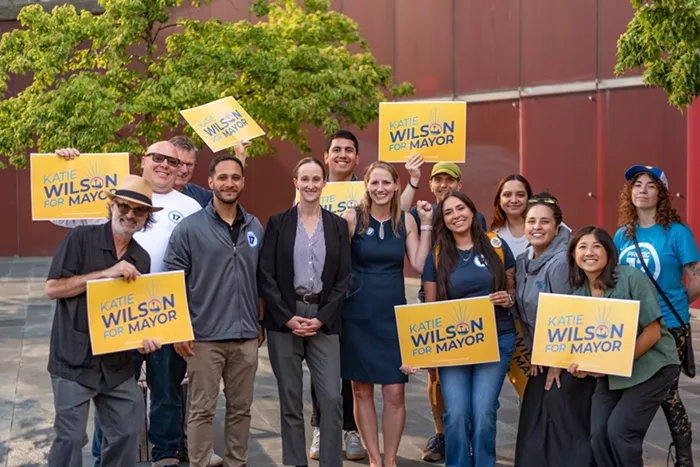This morning, in front of a small crowd of union members at City Hall, mayoral candidate Katie Wilson stood at a podium to accept an endorsement from PROTEC17.
“I am so honored to receive the endorsement of PROTEC17, and so grateful to the thousands of city employees who have decided to put their faith in our campaign because they believe in our vision of what Seattle can be,” she said.
The Working Families Party, the small but mighty progressive political party, spoke about why they were endorsing her. So did reps from UAW 4121 (graduate school workers), WFSE 1495 (state employees), the American Federation of Teachers (obvious, I hope), all of whom have already endorsed her. But PROTEC17 was the headliner.
This isn’t Wilson’s first endorsement, or even her first labor endorsement. So why throw a press conference about it?
Because PROTEC17 represents more than 3,000 city workers in Seattle—almost a quarter of the city’s workforce—which means this union is endorsing against their boss. This is the first time in recent memory that they’ve endorsed in the primary.
At the press conference, Karen Estevenin, Executive Director of PROTEC17, expressed two concerns that define Wilson’s campaign: affordability and progressive revenue. Katie shares their union values, Estevenin said.
“Katie overwhelmingly won our support with her concrete ideas, her doable plans to address these and many other issues that city workers and Seattle residents are facing,” she said. “PROTEC17 members, along with so many in this moment, are hungry for elected officials who can offer hope, who can offer inspiration, authenticity and a clear vision for a better world and the dogged tenacity to create it.”
In a blue city whose politics is defined by labor and business, Wilson seems like a natural union choice. In the last decade and a half, she’s been one of the lead organizers in the campaigns to raise the minimum wage (in Seattle and Burien), make transit affordable (you can thank her for that unlimited low-income Orca Card), and protect renters (she helped cap late fees and move in fees). But this Spring, MLK Labor Council (our county’s Union of Unions, so to speak), endorsed Mayor Bruce Harrell. So did SEIU 775, the caregivers union and main funder of Seattle’s Progressive People Power PAC.
The vote wasn’t unanimous, and several major unions reportedly abstained, but the endorsement got through. Katie Garrow, executive secretary-treasurer of MLK Labor, told the Seattle Times that they endorsed Harrell because he has a “proven track record of delivering real results for working people.” At the time, the “results” she pointed to were the city’s housing and transportation tax levies, and a new contract for the city’s unions that was more labor-friendly than expected. “Now, more than ever, blue cities like Seattle need experienced, strong elected leaders to uphold our values,” Garrow told the Seattle Times.
That was back in May, though, when Harrell’s fundraising seemed like it was leaving Wilson in the dust and most of the city didn’t know her name. It was easier to consider Harrell’s reelection as a foregone conclusion. In July, they’re neck and neck. Both candidates have collected the maximum number of democracy vouchers they’re allowed to in the primary, and they’ve raised almost the same amount of money: Harrell has raised $449,980 and Wilson has raised $449,829. Wilson even has slightly more individual contributors—5,978 to Harrell’s 5,100.
Outside of the feelings in the greater labor community, though, it’s no surprise that Harrell’s own employees might want a new boss. KUOW reported in March that, according to his niece (and senior deputy mayor) and six other women in City Hall, his administration is a misogynistic boys club, where women were condescended to and shut out of meetings in favor of white male advisors. Last year, PubliCola reported that the mayor’s office borrowed staff (and therefore budget lines) from other departments. The year prior, Harrell’s offered a 1 percent cost of living for essential city workers like electricians and librarians, while trying to coax rookie cops to join SPD with six-figure salaries and $30,000 signing bonuses, inspired workers to protest on the steps of City Hall.
Today, Wilson stood with city workers in the same place.
“I have been organizing alongside workers and labor unions for the whole of my career, because I believe deeply in the principle that lies at the very heart of the labor movement, solidarity.”




